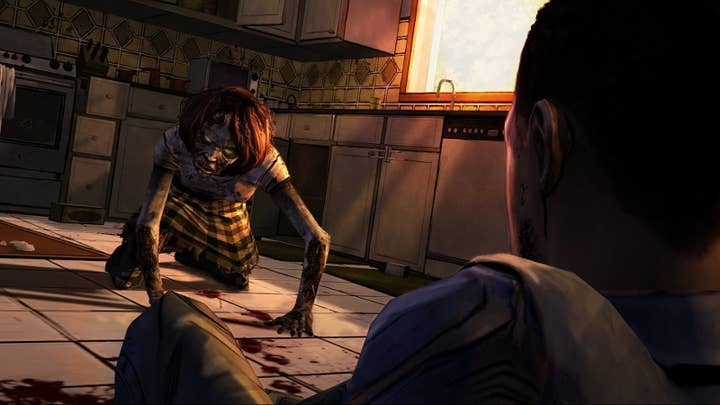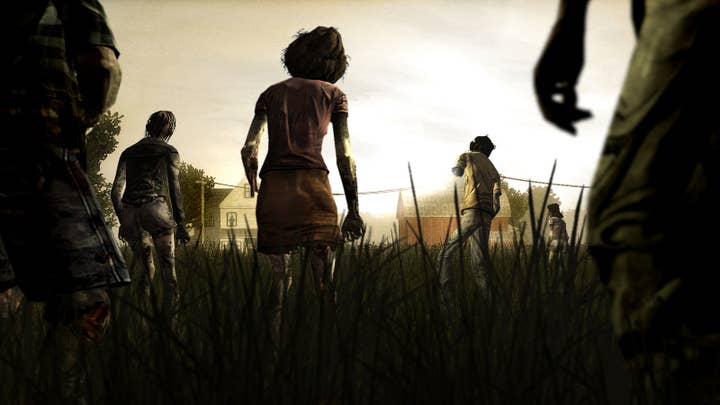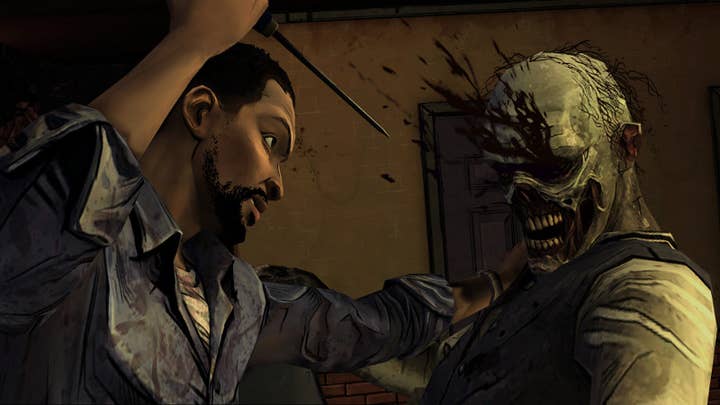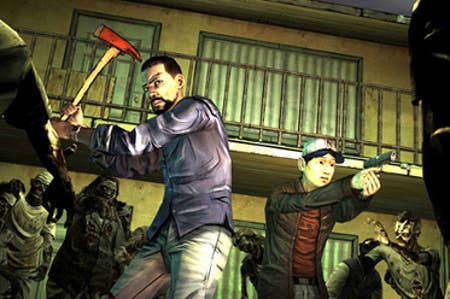Critical Consensus: The Walking Dead
Telltale Games' latest episodic series is at once a departure and an emphatic return to form
You probably already know whether Telltale Games is your kind of developer. A longstanding figurehead in the small but dedicated adventure game niche, a series of releases based on beloved IP like Monkey Island, Sam & Max, Wallace & Gromit and Back To The Future has earned the studio a curious kind of success - its products are generally successful, but how much of their popularity is down to the rose-tint of nostalgia is certainly open to question.
The way Telltale harnessed the tricky episodic format to create a healthy console and PC development business is undeniably impressive, but, until recently, new ideas seemed in short supply. The company's back-catalogue shows a string of releases that are uniformly fun, irreverent, and based on licenses that carry both of those qualities in their very DNA. Last year's Jurassic Park promised a bold new direction, but by most critics' estimation it was a failed experiment, and perhaps indicative of Telltale's weaknesses when stepping outside of its relatively small comfort zone.
In most respects, The Walking Dead presents an even stiffer challenge. Popular culture's fascination with zombies shows no sign of slowing, and the television series is doing about as well as a grimly violent, nihilistic drama has any right to expect, but in terms of both tone and resonance it's far less approachable than Jurassic Park or Back To The Future.

Indeed, Eurogamer's Christian Donlan begins his 7 out of 10 review of the first episode by identifying an unavoidable hurdle born of the company's success: Telltale's customers quite rightly think they know what to expect from the studio's releases, and these brave new changes in direction won't be to everyone's taste.
"Judged strictly as an adventure game...the first episode of The Walking Dead seems to be pretty disappointing stuff," he says. "The environments are only sparsely interactive, while the hot-spot interface is constrictive and sluggish to navigate with a mouse-and-keyboard set-up.
"It's nowhere near as dismal as Telltale's recent Jurassic Park offering, perhaps, but it falls a long way short of the company's better work"
Christian Donlan, Euorgamer
"More importantly, there are only a few genuine puzzles in the entire game, most of which aren't particularly well crafted. It's nowhere near as dismal as Telltale's recent Jurassic Park offering, perhaps, but it falls a long way short of the company's better work. The thing is, though, I'm not really sure that the weird kind of fanfic brand extension that Telltale's engaged in these days even count as adventure games anymore. If you take The Walking Dead as (sorry about this) a piece of interactive storytelling, it's actually a lot more successful."
In the light of other reviews, Donlan's opening salvo feels a touch unfair. The Walking Dead is widely regarded as Telltale consciously trying a new approach to the adventure game template - one based around characters, conversations and narrative choices rather than item puzzles and exploration - and most other critics seem more comfortable accepting the game on its own terms.
Destructoid's Fraser Brown, for example, is particularly impressed by how readily Telltale embraces its protagonist, Lee Everett's dire predicament. There's nothing explicitly wrong with a game built around dialogue sequences with dramatic weight, and choices with clear consequences.

"Characters will remember how you reacted in certain situations and if you're a shifty bastard or an open book. As the desperate survivors get more agitated and concerned, Lee is frequently caught in the middle," he writes in his 8 out of 10 review.
"He's also thrust into a lot of situations where you must decide who lives or dies and it's never pleasant. When your decisions count the most, you have the least amount of time to make your mind up. It can be an agonising situation to be in, but the guilt is just something you need to deal with."
"Even small decisions can affect your story in catastrophic ways, so when the big decisions come they're fantastically terrifying"
Justin McIlroy, Polygon
According to Fraser, the episode's handful of QTE action sequences do an unexpectedly good job of capturing the desperation and violence of a zombie attack - not to mention the emotional impact on the character holding the hammer - while the more traditional point -and-click sections are kept deliberately simple to keep the emphasis on the moment-to-moment drama of the story.
For Joystiq's David Hinkle, however, there are signs that the writing and characterisation may yield some problems as the series progresses. Individual scenes involving the principal characters - Lee Everett and Clementine, the young girl he is trying to protect - are well written and, in some cases, emotionally powerful, but the fringe characters tend to be "one-dimensional."
"This is the first episode of a series, so it's understandable that character establishment needs to be quick and concise. In other words, the 'jerk' archetype needs to be a jerk right from the get-go - we don't get to watch him slowly descend into jerkitude," he writes in his four-star review. "But it serves as a small detriment to the emotional impact and believability of The Walking Dead's characters. Hopefully they will grow throughout the season, giving them the weight and impact they deserve."

The website formerly known as "The Verge's gaming section", Polygon, can scarcely find a bad word to say about TellTale's work. Indeed, the first hundred or so in Justin McIlroy 's 9 out of 10 review are in descriptive first-person prose, which is fast becoming a sign that a Polygon writer is very excited about something and really wants to tell you about it.
McIlroy is struck by how complex and delicate The Walking Dead's conversations and character relationships can be, creating a "constant" tension that honours the television series' best moments while also standing apart as an interactive experience. "Even small decisions can affect your story in catastrophic ways," he notes, "so when the big decisions come...they're fantastically terrifying." On its default settings, The Walking Dead telegraphs these key moments, but McIlroy recommends turning the feature off and being, "surprised by the ripples of your decisions."
"That doesn't mean that 'wrong' choices will continue to haunt you. These are desperate characters on the brink of destruction, so there's little you can do to make things 'better', just ... different. As the player is freed from the burden of having to choose 'correctly' they can just experience the story as it unfolds and not fret too much about their inability to reload a save before they made a tough call.
"As I watched the credits and the tendons in my hand began to relax, I saw the consequences of my actions taking shape in the trailer for the following episode. I know retention is a big problem for episodic games, but I wouldn't miss seeing how my story plays out for anything, and I suspect you'll feel the same way."

